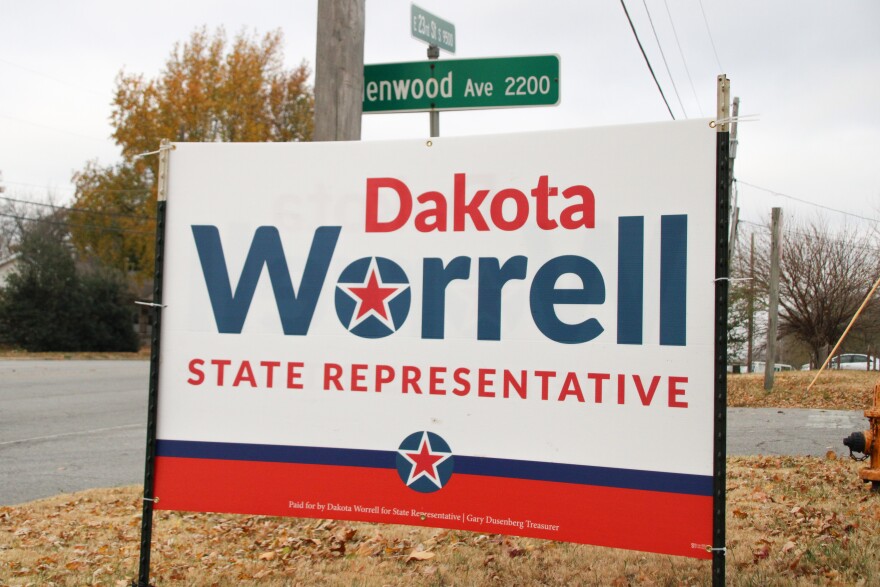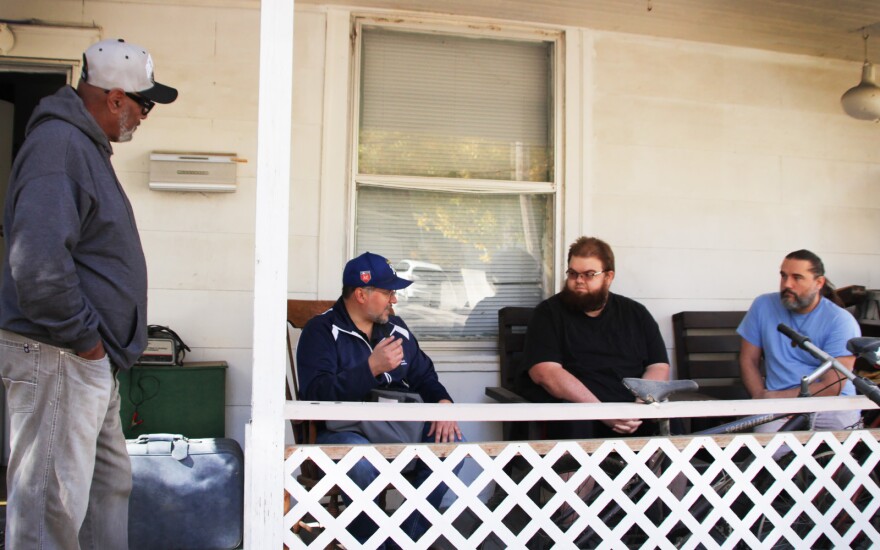On a brisk October evening at A Little BBQ Joint off 24 highway in Independence, Missouri, Democratic state Rep. Robert Sauls greets supporters, including the leaders of several area unions, at the last fundraiser for his reelection campaign.
Independence has long been a union town. Some experts say that union affiliation rates in the city are higher in Independence than in much-larger Kansas City, Missouri. And Sauls has succeeded as a Democrat here — even as the district has voted Republican in presidential elections — largely because of labor support. But as national talking points continue seeping into local politics, unions no longer vote as a bloc.
This is what Sauls is up against going into this year’s general election. In 2018, he ran unopposed in his Independence district, House District 21. In 2020 he won reelection by just 45 votes.
The close margin in the last election doesn’t faze him much.
“It's true, it was close,” Sauls said. “But the thing that's always left out about that is I was the only Democrat in the entire state of Missouri to win a district Donald Trump won.”
Sauls, who primarily practices labor law, sees himself as a working-class representative in a solidly working-class district. He believes in this election, people will vote for their livelihoods over social ties that determine political parties.
When a working-class district “just feels lost”
The majority of the nearly 39,000 people in Missouri’s 21st district earn a household income between $24-42,000 per year. Sauls takes pride in the city’s high union activity and its working-class demographic. He became a third-generation union member when he joined the Teamsters and the public safety union, International Association of Fire Fighters Local 42 at different times in his career, and both his father and grandfather were members of United Auto Workers.
“I'm a product of this,” Sauls said. “My mom was a single mom. I'm from a working-class family. And that's what this community is. I know exactly what it's like to struggle to get bills paid. I know exactly what it's like living paycheck to paycheck and trying to make your dollar stretch so that you can make it to the next paycheck.”
His district — which covers most of central Independence, from Blue Ridge Boulevard to the west, as far as 269 Highway in the north, 31st Street in the south, and Speck and Turner avenues in the east — has become more Democratic under recent redistricting.
But that’s not much of a comfort to Wade Kiefer, political director for the electrical worker’s union, International Brotherhood of Electrical Workers Local 124. He said Sauls is one of the only pro-union candidates in Eastern Jackson County and the only labor-friendly candidate in the area that they think is possible to elect after state redistricting.
“In this race, it's been interesting. Politically this has been a more contested spot,” Kiefer said. “It's always been our hardest one to try and keep safe. In speaking with some of the people from Independence, I think the general electorate just feels lost.”

Democrats have been slowly gaining ground in suburbs across the country in the past decade. In the 2020 election, the majority of the electorate voted for the party in large suburbs and small metro areas for the first time since 2008. In the Kansas City metropolitan area, the number of registered Democrats in Johnson County, Kansas, grew by 42% in the 2020 election.
But Independence defies that trend.
While Republicans lost ground in the presidential vote – where Trump won the 2020 election by 8 points less than he did in 2016 – Democrats have been losing votes in nearly every other category. In 2018, Democrats took the election for State Senator in Eastern Jackson County by just 1 point, down 3 points from the party’s lead in the Kander-Blunt race in 2016.
Though Sauls would rather keep the focus on local issues, his opponent, 27-year-old Dakota Worrell, has been using national talking points in his campaign against the two-time incumbent.
Worrell does not have an official website, has not participated in any debates or candidate forums held in the district and did not respond to repeated requests for comment for this story.
In a campaign video, he says the district needs “strong leaders who will stand up to the woke mob.” On his campaign Facebook page, Worrell voices his opposition to critical race theory and “leftist ideology” in schools, says “corrupt politicians and lifelong bureaucrats” are responsible for inflation, and says that Independence needs a “fighter in Jefferson City who will advocate for us and represents our values.”
Democrat Emily Weber, who represents District 24 in Kansas City, is running unopposed. She’s been campaigning for Sauls to keep his seat and said those talking points don’t apply to him.
“I am the leftist Democrat, Robert Sauls is not,” Weber said. “And that's what Independence needs. They need somebody who's a little bit more moderate. Our votes differ, but at the end of the day, I'm voting for my community and he's voting for his.”
Sauls currently sits on six committees in the House, including the Ethics and Veterans committees. He’s campaigning on increasing teacher pay and school funding, raising the minimum wage, and creating targeted tax cuts for working-class families.
“I mean the American dream isn't a teacher working at Chrisman (High School) making $34,000 a year having to pay for supplies and having to pick up a second job,” Sauls said.
While the Independence School District has a starting teacher pay of $41,150, Missouri ranks 50th in the nation for average starting salary at just over $33,000.
In the past legislative session, he sponsored a bill exempting the retail sale of food from sales tax, a Firefighters’ Bill of Rights, a cancer presumption bill for first responders and at least three other bills relating to worker’s compensation or benefits.

Sauls said he’s disagreed with his party on many votes, including when he voted yes on HB 1606, banning unhoused people from sleeping outside on state-owned land.
“There are often times when I will get some flack from some of my colleagues who take issue with the way I voted,” he said. “I'm not there to support a party, I'm there to support my people. Now oftentimes those issues line up, but sometimes they don't. At the end of the day, I'm not sent there to be some Democrat’s stand-in, I'm sent there to represent people in Independence, Missouri.”
Sauls is hopeful the record increase of union petitions nationwide and the fact that support for unions is at its highest in more than 50 years will help his reelection.
“We've seen over the years labor participation decline — some of that's because of the policies that the Republicans have instilled,” Sauls said.
He referred to the Supreme Court’s Janus v. State decision; Missouri’s 2018 SB 1007, which meant public employee union members could be fired at any time; the state’s 2017 right-to-work law that passed the GOP-controlled legislature before being rejected by voters; and a slew of other Republican-backed bills as reasons why union supporters should vote more Democrats like him into office.
A new message to unify the unions
Historically, union members voted as a bloc for labor-friendly, typically Democratic candidates. But that changed decades ago when union affiliation began shrinking.
“We've noticed that in about all of our union (membership) about half are Republican, half are Democrat,” Kiefer said. “But that's just party lines — ideologically, a lot of them are pretty moderate.”
About half of IBEW 124’s membership still votes for “what’s good for them and their paycheck,” Kiefer said. But he said national talking points are influencing the ways the other half of the union members vote — and dissuading them from supporting labor-backed candidates.
“Over the last 40 years they've turned it into a culture war,” he said. “People stopped caring about what party is attacking your unemployment, what's making job security safe for you. It's more about religion, guns, LGBTQ issues. That's what people have started to focus on rather than who they are as a worker.”

Dan Heizman, president of IAFF Local 42, said the firefighters union hasn’t struggled with the partisan issues as much as others. He said unions need to change their messaging and embrace the bipartisanship of their membership.
“We have seen some of that Democrat support erode in labor organizations,” Heizman said. “The firefighters have been one of those labor organizations who are more bipartisan for longer than a lot of the traditional labor organizations.”
The IAFF Local 42 will endorse candidates from any party so long as they support firefighter and labor issues. Heizman said Sauls does both of those things.
“They try and get us all caught up in the social issues and the lightning rod issues that politics is involved with today,” Heizman said. “At the end of the day, what labor organizations should be focusing on is why these candidates are good for their paychecks, their right to collectively bargain, their right to organize and their right to be in a union.”
Kiefer said the AFL-CIO has begun a new messaging and education campaign to once again strengthen the union vote.
“We have our own union member-to-member campaign. So we'll go out through the AFL-CIO and speak out to other union members, like, ‘Hey, whatever you're watching on TV — I get it, you know, it's crap. It's crazy, it's maddening sometimes — but here at the local level, it's much more tame. This is your candidate, he's not whatever angst or anger you have toward a political party.’”
Sauls has also been fine-tuning his messaging. Each year he’s been in office, he’s knocked on constituents’ doors to discuss what matters to them. He said he makes it a point to return calls and emails quickly.
“Unions a lot of times support Democrats, but you certainly have Republicans within unions,” Sauls said. “I think some of that is Democrats not knowing how to message and work within these areas. But it's something that I do, and that I do well if I can actually have that conversation.”
Kiefer said Sauls — who is currently representing some members of IBEW 124 in his capacity as a labor lawyer — “is one of our best union leaders.” He said he’s hoping union members in Independence will heed the new messaging and unite under Sauls.
Sauls maintains that using national talking points in state politics is a distraction for voters.
“Republicans want to focus on the national stuff,” he said. “They want to focus on the flashy things to try to direct your attention away from these local issues. Because if they don't, then they got to talk about why the schools are underfunded, why the roads are crap. This is directly on them because they've been in charge for so long.”
Republicans have controlled the state house since 2003. Now Democrats are only six seats away from breaking the GOP’s supermajority. To avoid losing any ground, Sauls needs to keep his seat.
“What I think a lot of people don't understand is that the legislature is 70% Republican,” Sauls said. “I think that's an important thing to focus on because, realistically, Missouri is not 70% Republican. Ultimately I think people want checks and balances.”






